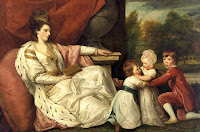 Our Regency heroes were all dressed as girls for the first few years of their lives. Sad but true, and somehow they grew up normal; the upside of it was that they then enjoyed the formal ceremony of being breeched–that is, allowed to wear pants. And other than the cross-dressing, it wasn’t that bad a time to be a child, if you survived, and, of course, had the additional luck of being born into a family with money and education.
Our Regency heroes were all dressed as girls for the first few years of their lives. Sad but true, and somehow they grew up normal; the upside of it was that they then enjoyed the formal ceremony of being breeched–that is, allowed to wear pants. And other than the cross-dressing, it wasn’t that bad a time to be a child, if you survived, and, of course, had the additional luck of being born into a family with money and education.
 Children were no longer seen as adults in miniature or full of original sin that needed to be flogged out of them. Childhood was becoming recognized as a stage in life, much as the 1950s spawned the cult of the teenager, thanks to Rousseau’s Emile, a novel that explored the ideal upbringing of a child (ironically, Rousseau sent his own children to be raised in an institution, hoping they’d have a better chance in life there than as the illegitimate offspring of an impoverished writer). Wordsworth and Blake wrote about childhood as a state of mystical innocence.
Children were no longer seen as adults in miniature or full of original sin that needed to be flogged out of them. Childhood was becoming recognized as a stage in life, much as the 1950s spawned the cult of the teenager, thanks to Rousseau’s Emile, a novel that explored the ideal upbringing of a child (ironically, Rousseau sent his own children to be raised in an institution, hoping they’d have a better chance in life there than as the illegitimate offspring of an impoverished writer). Wordsworth and Blake wrote about childhood as a state of mystical innocence.
 Children now had their own styles of clothing, such as the skeleton suit for little boys and the late eighteenth-century styles for girls’ clothes–high waisted, simple cotton gowns–later became the fashion for adults. Books, games, and puzzles were produced for children, and not all the books were improving texts.
Children now had their own styles of clothing, such as the skeleton suit for little boys and the late eighteenth-century styles for girls’ clothes–high waisted, simple cotton gowns–later became the fashion for adults. Books, games, and puzzles were produced for children, and not all the books were improving texts.
But even in those relatively enlightened times, and in affluent families, the infant mortality rate was appallingly high. It makes you wonder what the relationships between children and parents were like–did parents love their children without reservation, knowing they might have only a short time together? Or did parents repress their natural feelings to protect themselves from the grief to come?
In a biography of Mary Wollstonecraft I read (sorry, can’t remember which one), there was a truly heartbreaking excerpt from a letter Mary wrote after losing a child–but the thing that struck me as odd was that she referred to the baby as it. It could be a linguistic oddity–like the French word bebe not entering the language until the late nineteenth-century. But words are important, as we know. Does this reflect an attitude of the past that is quite alien to us now? Is this how the Regency produced Victorians?
And how do you feel about the portrayal of children in romances? Quoting myself, number seven in the top ten things a heroine would never say in a Regency romance (from The Rules of Gentility):
I don’t care if that adorable lisping child is the apple of the hero’s eye. If she doesn’t shut up I’ll slap her.
